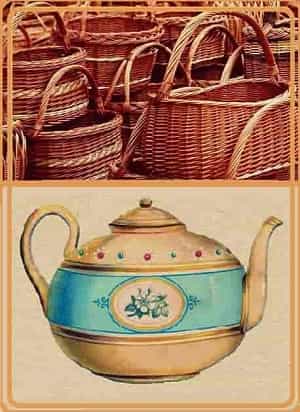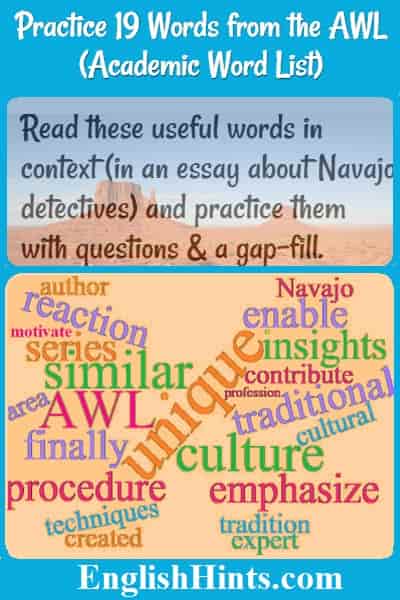Practice
19 Words from the AWL (Academic Word List)
The AWL (Academic Word List) contains 570 of the most useful words for reading professional articles or academic texts on many subjects, from the sciences and social sciences to medicine, law, history, and the arts.
If you'd like, you can skip the explanation of the AWL and go straight to the practice questions. (The questions are a way to practice test-taking as well as vocabulary. The multiple choice questions are similar to many of the question types on American high school or university tests or the TOEFL Reading Test.)
Practicing the AWL with English Detective
Most of these words are also important to know for major academic tests like the TOEFL, IELTS, or SAT. The first 23 issues of the English Detective newsletter taught and practiced the whole AWL. Many of the practice exercises became pages on EnglishHints. (See the links on Academic Vocabulary Word Lists.)
The questions and exercises on this page were originally part of the first English Detective newsletter. It was too long to be really usable, so I removed parts from Back Issue #1 to make this page and Sherlock Holmes and the Language of Detection.
(That page practices another 17 words from the AWL: accurate, acquired, analysis, aspects, attain, conceived, conclusion, deduction, detected, evidence, inferred, inspection, investigation, link, mental, process, revealed, and their variations or “word family” members.)
The background explanation and links (plus more practice) are still in that newsletter issue, linked at the very bottom of the Back Issues page.
On this page you can learn and practice AWL vocabulary from an article I wrote about Tony Hillerman.
Hillerman is an author who writes a different kind of detective fiction that also explores Navajo culture.
That vocabulary includes area, author, contribution, created, cultures, emphasis, enable, experts, finally, insights, motivation, procedure, professional, react, series, similar, techniques, traditions, unique, (and instinct, not on the AWL.)
You’ll also see the use of several other words from the AWL that aren’t specifically practiced here.
Practice Questions: Words from the Navajo Detectives Article
Read this article on author Tony Hillerman and his Navajo detectives. Then review and practice the AWL vocabulary below.
You can just write the correct letter for each answer, and the words to fill in the blanks (for the Unique Men story) on a piece of paper and check your answers at the bottom of the page.
1. An author is the person who writes a book or article. So Tony Hillerman is the author of The Wailing Wind, and I am the author of the article “Tony Hillerman and his Navajo Detectives.”
Sir Arthur Conan Doyle wrote A Study in Scarlet about Sherlock Holmes. The narrator (the fictional person who tells the story) is Dr. Watson. Just to check if you understand this clearly, who is the author of A Study in Scarlet?
A) Sherlock Holmes
B) Dr. Watson
C) Sir Arthur Conan Doyle
D) someone else
2.Hillerman’s detectives are unique, or different from the detectives most authors write about, because they are Navajos. They understand Navajo culture-- the Navajo way of life.
Culture includes everything about the way a particular group of people live. People of every culture eat, sing, raise children, and think about life and death, but each group practices these activities in somewhat different ways, and that is their culture.
Which of these is NOT a cultural difference?
A) Some people eat a lot of rice and a little fish at most meals; others eat more bread and cheese; or yams and tropical fruits.
B) In some places young men and young women are not allowed to be together without adult supervision; in others they are together often.
C) Some people drive cars to work; others take the bus or ride bicycles to their jobs.
D) Some mothers carry their young children on their backs with them while they work; in other places many young children are cared for in one place.
3. To emphasize something is to give it importance. One difference between cultures is the amount of emphasis they place on different actions. For example, in many parts of the U.S., meals are often eaten quickly between activities. In some other cultures, a meal is an important time for families to be together and relax. These cultures emphasize
A) taking at least an hour to eat
B) the value of eating together
C) the importance of food
D) the tradition of a meal of many different kinds of foods
4. ‘Professional’ has several meanings:
- someone who is highly educated in a profession (high-level occupation like teaching or medicine, nursing, or the law.)
- people who are paid for their skills: professional football players, musicians, or actors (compared to amateurs who do those for pleasure rather than money.)
- ‘Professional’ is also an adjective to describe someone who does their work in a very responsible, disciplined manner: “that receptionist is very professional in the way she handles angry clients.”
Which of these occupations (jobs) is a profession?
A) a salesman
B) a fast-food cook
C) a farmer
D) a lawyer
5. To create is to make something new, as God created the earth or as someone invents an entirely new product (like the first telephone.) Sir Arthur Conan Doyle created the modern detective novel. Which of these is false?
A) Walt Disney created Disneyland
B) Alexander Graham Bell created the telephone
C) Benjamin Franklin created electricity
D) Miguel Cervantes created Don Quixote.
6. A motive is a person’s reason for acting. Sometimes we talk about hidden motives, when people pretend to be helping others when their actual motive is personal gain. To motivate is to move someone to action. Motivation is what moves a person-- very similar to motive.
Which of these would not be a motivation to run for president?
A) a desire for power
B) a desire for fame and honor
C) a desire to help people
D) a desire to relax and work less
7. An area is a region or place. It might be the surroundings for a city: for example the Chicago area. Area also is a measurement term. The area of a rectangle is its length times its width.
If you got sick while visiting an unfamiliar area (somewhere you don’t know well), which of these questions would NOT help you find local medical help?
A) Is there a hospital near here?
B) Is there a hospital in this area?
C) Is a hospital in your area expensive?
D) Do you have a local hospital?
8. A tradition is an established way of doing things. It can be a holiday custom many people follow year after year like decorating a tree at Christmas or eating turkey on Thanksgiving, or just the old ways that people in a certain area have followed for generations.

Which of these is a traditional way to keep in touch (continue to communicate with friends who are far away)?
A) send an email
B) send a letter or Christmas card
C) make a phone call
D)send a text message
9. Instincts are feelings or reactions that do not have to be learned, but are in all people (or animals) from birth. The maternal instinct causes human or animal mothers to care for and protect their babies. Babies have an instinctive fear of loud noises. Predators like dogs, cats, or lions instinctively chase small animals (or even objects like a stick or a string) that move.
Which of these is an instinct?
A) A dog sitting up when its owner says “Sit!”
B) A fish biting a hook hidden in a worm.
C) A policeman lifting a gun when he sees a criminal reach into his coat.
D) Children running outside when they hear an ice cream truck nearby.
10.Techniques are the methods and procedures used in various skills. One good study technique is
A) to review for short periods frequently.
B) to study all night before a big exam.
C) to write down every word the teacher says and then rewrite the whole lecture.
D) to copy your best friend’s notes, even if they don’t make sense.
11. A series is an ordered group of things, like a list, or events that happen in a definite order. Which of these sentences does NOT use ‘series’ correctly?
A) A series of earthquakes occurred between 10 and 12 AM yesterday.
B) The World Series is a group of baseball games between winning teams to determine the top team of them all.
C) She shopped for a series of vegetables, fruits, and desserts.
D) The teacher planned a series of tests to prepare students for the final exam.
12. Similar means almost the same: alike. Which of these are similar?
A) Handwriting and printing.
B) Vegetables and fruits
C) A twin brother and sister
D) Two twin brothers
13. Final means last. Which of these are CORRECT uses of ‘finally?’ (There are more than one.)
A) To introduce the last point of an essay: “Finally, we need detectives to solve crimes.”
B) To describe the last event: “The finally race will be a relay.”
C) To tell someone we have been waiting: “You have finally arrived!”
D) To express relief: “I’m finally done!”
14. ‘En’ is a prefix that sometimes means ‘in’, but often turns an adjective or noun into a verb meaning ‘to make ____’:
- to enrich- to make rich,
- to enlighten- to cause or increase light (give light or understanding on a subject),
- to envision- to get a clearer vision or imagine something
So to enable means
A) to make a table
B) to make a new ability
C) to make able
D) to make someone disabled
15. A procedure is like a process: a standard, fixed order for doing a particular kind of work. A supervisor tells a new employee, “You’re not following the proper procedures for taking inventory!” What should the new employee do?
A) Say “This is the way they taught me to take inventory at my old company!”
B) Ask for an explanation or demonstration of the company’s preferred procedure.
C) Put on his uniform.
D) Leave the office.
16.Experts are people who know more than most people about a subject. ‘Expert’ can also be an adjective. At a murder trial, to prove the cause of death they might need an expert witness who is a
A) mechanical engineer
B) lawyer
C) nuclear physicist
D) doctor
17. Unique means one-of-a-kind: the only one, with nothing else similar to it. Which of these works of art is unique, with no others like it?
 Which is unique, the basket design, the teapot, or?
Which is unique, the basket design, the teapot, or?A) a Victorian teapot
B) a traditional basket design
C) an elegant Roman wine glass
D) Picasso’s painting ‘Guernica.”
18.Insight is a clear understanding of something-- often a new or better understanding than most people have. Which of these is NOT an insight?
A) Tommy getting the right answer on his math test
B) Einstein developing the theory of relativity.
C) Shakespeare writing about Mac Beth’s motivations
D) Pasteur realizing that tiny bacteria caused many diseases
19. To react is to act in response to something that happens. (Being proactive is acting first, not waiting for a problem to develop.) If someone hits you in the nose, which of these is not a normal reaction?
A) Getting angry
B) Hitting back
C) Running away
D) Smiling at the person
20. To contribute is to give or share something with others. Which of these possible slogans for a non-profit organization is badly worded?
A) If you can’t give money, contribute your time.
B) Your contributions are tax-deductible.
C) Thanks for contribute.
D) Thank you for contributing to our cause.
Two Unique Men from Very Different Cultures
Fill in the blanks. You will need each word only once, so you can cross it off once you use it.
area, author, contributions, cultural, culture, enabled, expert, insights, motivated, reaction, techniques, traditional, unique
1 A-D. Alfred Kroeber was an anthropologist (a scientist who studies human cultures) at U. C. Berkeley during the early and mid-20th century. He was an ____________ on California Indian cultures, and was the ¬¬¬__________ of several books about it. Kroeber made many _____________ to the study of __________ anthropology.
2 A-B. As a professional anthropologist and linguist, he was called to interpret when a lone native American named Ishi came out of the northern California hills about 1910. (Most people had thought there were no Indians left in that ____________who still lived the ____________ way, without using western tools or clothing or understanding any English.)
3 A-D. Ishi’s first ____________ to western civilization was fear, but he learned to trust Kroeber. Ishi ____________ anthropologists to gain new _____________ into a ____________ that no longer existed.
4 A-C. He demonstrated many of the traditional ________________ for making the tools that had helped him survive alone for so long. Ishi’s ______________ story may have ____________ a new generation of students to become anthropologists.
There’s a short article about Kroeber and Ishi, with photos, here.
Home > TOEFL & IELTS Vocabulary Practice > Practice 19 Words from the AWL.
Answers
1. Who is the author of A Study in Scarlet?
C) Sir Arthur Conan Doyle
2. Which of these is NOT a cultural difference?
C) Some people drive cars to work; others take the bus or ride bicycles to their jobs. (This answer involves an individual or economic choice; the others are often the result of culture-- the way a whole group of people has traditionally done things.)
3. These cultures emphasize
B) the value of eating together
4 Which of these occupations (jobs) is a profession?
D) a lawyer
5. Which of these is false?
C) Benjamin Franklin created electricity.
(Electricity is a natural force. Franklin studied it, and was interested in ways to use it, but it existed long before he did.)
6. Which of these would not be a motivation to run for president?
D) a desire to relax and work less
7. If you got sick while visiting an unfamiliar area (somewhere you don’t know well), which of these questions would NOT help you find local medical help?
C) Is a hospital in your area expensive?
8. Which of these is a traditional way to keep in touch (continue to communicate with friends who are far away)?
B) send a letter or Christmas card
9. Which of these is an instinct?
B) A fish biting a hook hidden in a worm. (The other actions have been learned through past experiences or training.) Instinct is not on the AWL list.
10. One good study technique is
A) to review for short periods frequently.
11. Which of these sentences does NOT use ‘series’ correctly?
C) She shopped for a series of vegetables, fruits, and desserts.
12. Which of these are similar?
D) Two twin brothers
13. Which of these are CORRECT uses of ‘finally?’ (There are more than one.)
A) To introduce the last point or argument of an essay: “Finally, we need detectives to solve crimes.”
C) To tell someone we have been waiting: “You have finally arrived!”
D) To express relief: “I’m finally done!”
(B) is incorrect: To describe the last event: “The finally race will be a relay.” It should say the “final” event. Finally is an adverb, so it can’t be used to describe a noun.)
14. So to enable means
C) to make able
15. What should the new employee do?
B) Ask for an explanation or demonstration of the company’s preferred procedure.
16. At a murder trial, to prove the cause of death they might need an expert witness who is a
D) doctor
17. Which of these works of art is unique, with no others like it?
D) Picasso’s painting ‘Guernica.”
18. Which of these is NOT an insight?
A) Tommy getting the right answer on his math test
19. If someone hits you in the nose, which of these is not a normal reaction?
D) Smiling at the person
20. Which of these slogans for a non-profit organization is badly worded?
C) Thanks for contribute. (Don’t use a verb after a preposition. Use a noun or a gerund: Thanks for your contribution or Thanks for contributing.)
Two Unique Men: Answers
area, author, contributions, cultural, culture, enabled,
expert, insights, motivated, reaction, techniques, traditional, unique
Alfred Kroeber was an anthropologist (a
scientist who studies human cultures) at U. C. Berkeley during the early and
mid-20th century. He was an expert on California Indian cultures, and
was the author of several books about them. Kroeber made many contributions
to the study of cultural anthropology.
As a professional anthropologist and linguist,
he was called to interpret when a lone native American named Ishi came out of
the northern California hills about 1910. (Most people had thought there were
no Indians left in that area who still lived the traditional way,
without using western tools or clothing or understanding any English.)
Ishi’s first reaction to western
civilization was fear, but he learned to trust Kroeber. Ishi enabled
anthropologists to gain new insights into a culture that no
longer existed.
He demonstrated many of the traditional techniques for making the tools that had helped him survive alone for so long. Ishi’s unique story may have motivated a new generation of students to become anthropologists.
Didn't find what you
needed? Explain what you want in the search box below.
(For example, cognates, past tense practice, or 'get along with.') Click to see the related pages on EnglishHints.
| site search by freefind | advanced |







